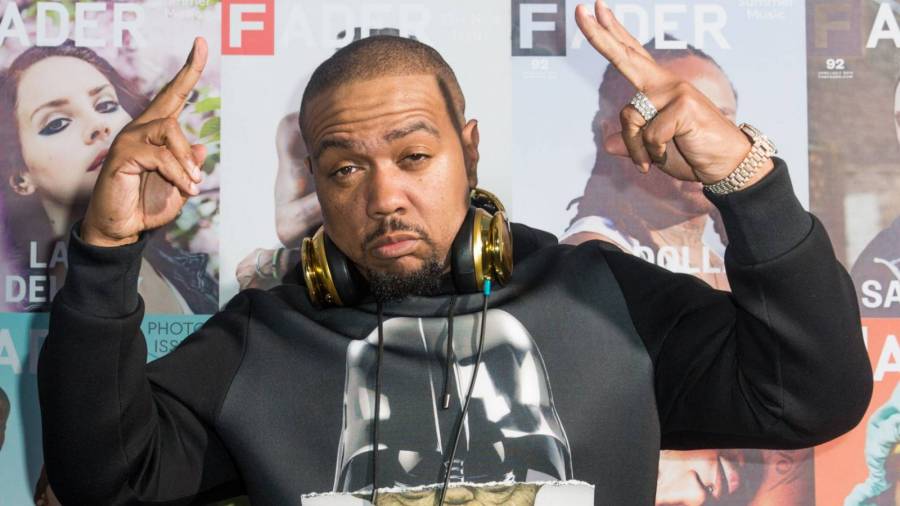Apparently Some People Don't Understand How Hip Hop Samples Work — Exhibit: Timbaland

Editorial – Hip Hop has been a colorful cornucopia of different genres since inception and samples have always been its essential building blocks. A producer finds a track they like, reuse of a portion (or sample) of a sound recording in another recording and make it their own.
Still, veteran producer Timbaland found himself a trending Twitter topic on Monday (January 18) after he was accused of “stealing” samples for some of his biggest hits, begging the question, “Do some people still not understand how Hip Hop works?”
A young woman by the name of Nooriyah kicked off the chatter after she shared a video of herself playing three Middle Eastern songs used in Timbaland’s work. The songs included the 1957 single “Khosara” by Egyptian singer Abdel Halim Hafez (and later, Hossam Ramzy who released “Khosara Khosara” in 1994), which was heavily sampled for JAY-Z’s 2000 hit “Big Pimpin.”
“Everyone knows @Timbaland is a master of his craft,” she captioned the post. “Did you know these three hits sampled these Arabic classics? To hear more about the Middle Eastern influence in Western mainstream music (that was once called “Belly dance music”) head to my Plus 1 Radio show on Soundcloud.”
Everyone knows @Timbaland is a master of his craft. Did you know these three hits sampled these Arabic classics? ? To hear more about the Middle Eastern influence in Western mainstream music (that was once called “Belly dance music”) head to my Plus 1 Radio show on Soundcloud pic.twitter.com/kCetOo6ONH
— Nooriyah (@Nooriyah_) January 18, 2021
Other songs played in the video are “Alouli Ansa” from Syrian singer Mayada El Hennawy and “Batwannis Beekarda” by Algerian-Lebanese singer Warda, which were used in Aaliyah’s 2001 single “More Than A Woman” and 2003’s “I Don’t Know What To Tell Ya,” respectively.
Despite the fact Hip Hop has always been a melting pot of funk, soul, jazz, R&B and any other genre one could possibly dream up, Timbo was still dragged through the dirt and the debacle put a spotlight on the generational disconnect that often rears its ugly head in current Hip Hop culture.
Timbaland really stole/copy/paste from Middle Eastern music and I really thought this nigga was a genius. WOW. https://t.co/Trs7acSREc
— ✨bel misses her hoodie ?✨ (@belciee) January 18, 2021
As one Twitter user attempted to explain, “People don’t know how samples and clearances work I see. He didn’t steal it guys. He paid for it and flipped with his own touches. He also has many non sampled beats as well. This just hip hop.”
Yep — and that’s just how Hip Hop has historically worked. Snoop Dogg sampled vocals and lyrics from Slave’s 1980 single “Watching You” for 1993’s “Gin & Juice” from his celebrated debut solo album Doggstyle. DJ Quik lifted the rhythm and some of the lyrics from Kleer’s 1984 cut “Tonight” for his classic “Tonite” from 1991’s Quik Is The Name, while Dr. Dre pretty much ransacked Parliament-Funkadelic’s entire catalog for his 1992 solo debut The Chronic.
Let me see if I’m following along. So ppl are trying to discredit #Timbaland for sampling songs that became classic records in the '90s and 2000s but they haven’t a clue that most of today’s songs sample records from the 90s and 00’s pic.twitter.com/LMvpRJd4JN
— emiliosparks (@emiliosparks) January 18, 2021
A quick peruse of the WhoSampled website and it’s easy to get a taste of the sheer number of samples pulsating through Hip Hop songs. But as Hip Hop ages, we’re starting to see Hip Hop sampling Hip Hop — like Megan Thee Stallion’s “Girls In The Hood,” which basically borrowed the entire concept from Eazy-E’s 1987 track “Boyz In The Hood.”
But guess what? — and this may totally blow your mind, I know — N.W.A & The Posse sampled Jean Knight’s 1971 hit “Mr. Big Stuff,” Original Concept’s “Pump That Bass” and Whodini’s “I’m A Ho,” in addition to NINE OTHER SONGS for that track.
Other albums such as EPMD’s Strictly Business comes with a plethora of samples from ’70s and ’80s soul/funk, including Faze-O’s Billboard Hot 100 hit “Riding High,” which serves as the sonic blueprint for “Please Listen To My Demo,” and Kool & The Gang’s 1973 song “Jungle Boogie,” which helped build “You’re A Customer.”
And by no means is sampling a walk in the park. In 2007, both Timbaland and JAY-Z were sued for copyright infringement by Ramzy’s uncle Osama Ahmed Fahmy. Four years and hundreds of thousands of dollars later, U.S. District Judge Christina A. Snyder ruled the family didn’t have the right to pursue a copyright claim against Jay or Timbo. With a little Egyptian magic,”Big Pimpin’” went on to peak at No. 18 on the Billboard Hot 100 and was the most successful single from Vol. 3… Life and Times of S. Carter.
Unless you’re a Hip Hop producer like Pete Rock who recently stepped outside of the box with his first sample-free record Petestrumentals 3, you’re sampling. It’s sad in 2021 this still needs to be explained but before anyone attempts to “cancel” Timbaland, study up and leave the man alone.
Twitter doesn't know what sampling is and they're cancelling actual Timbaland because of it ???????????
— praks (@parks81) January 18, 2021


